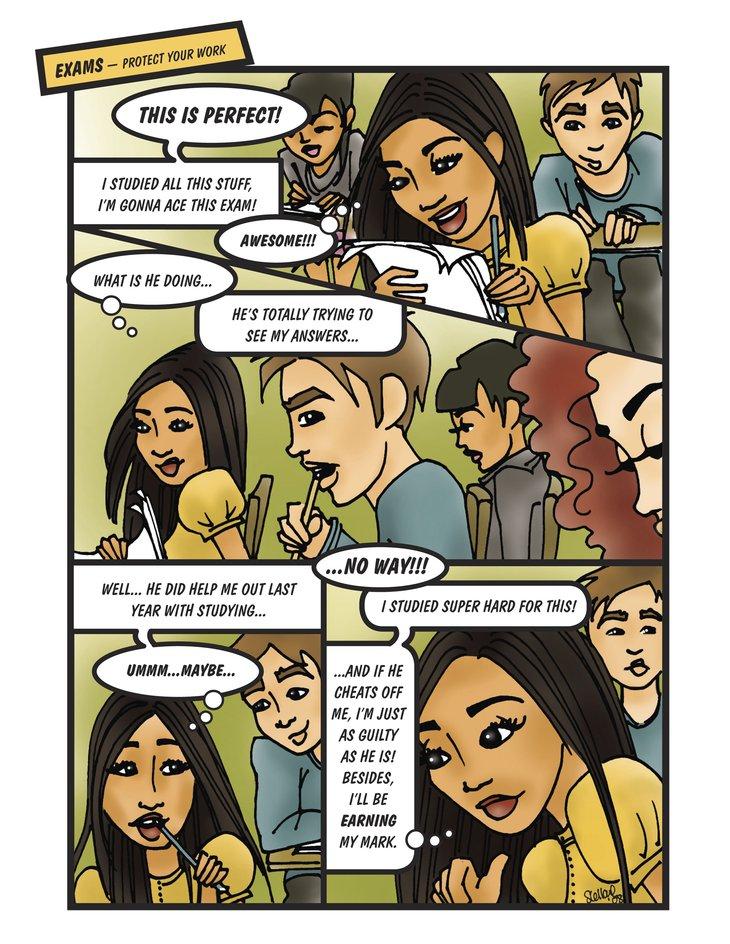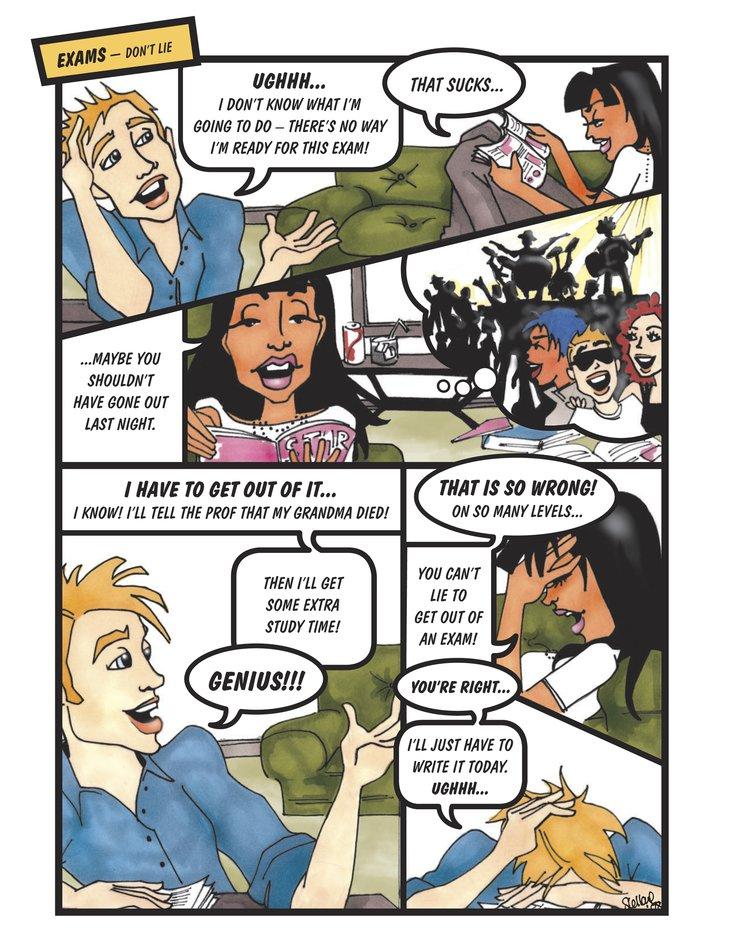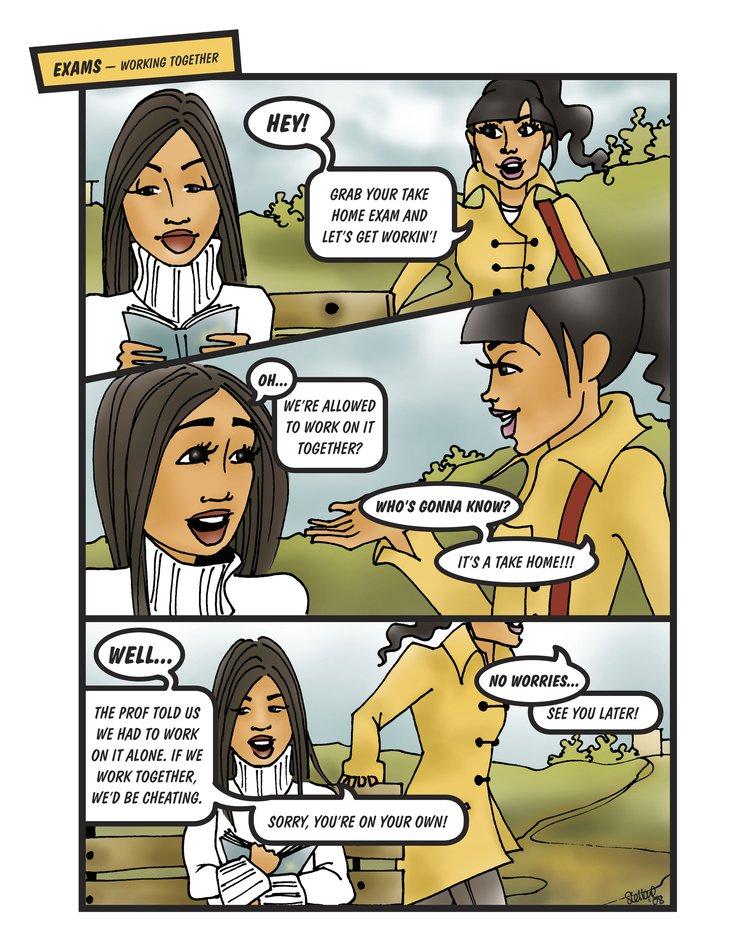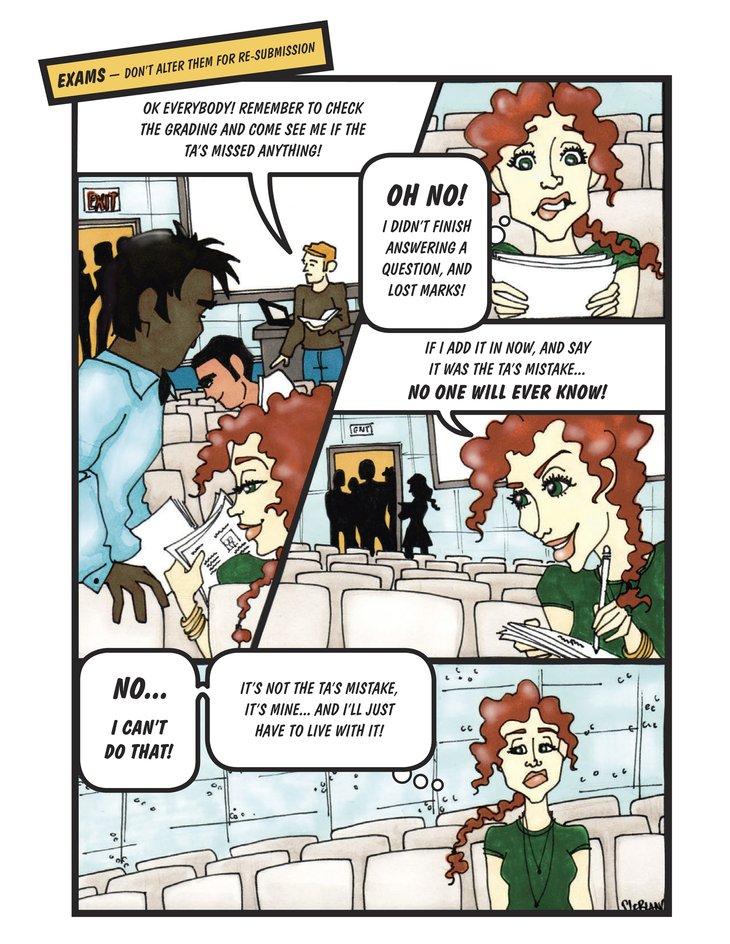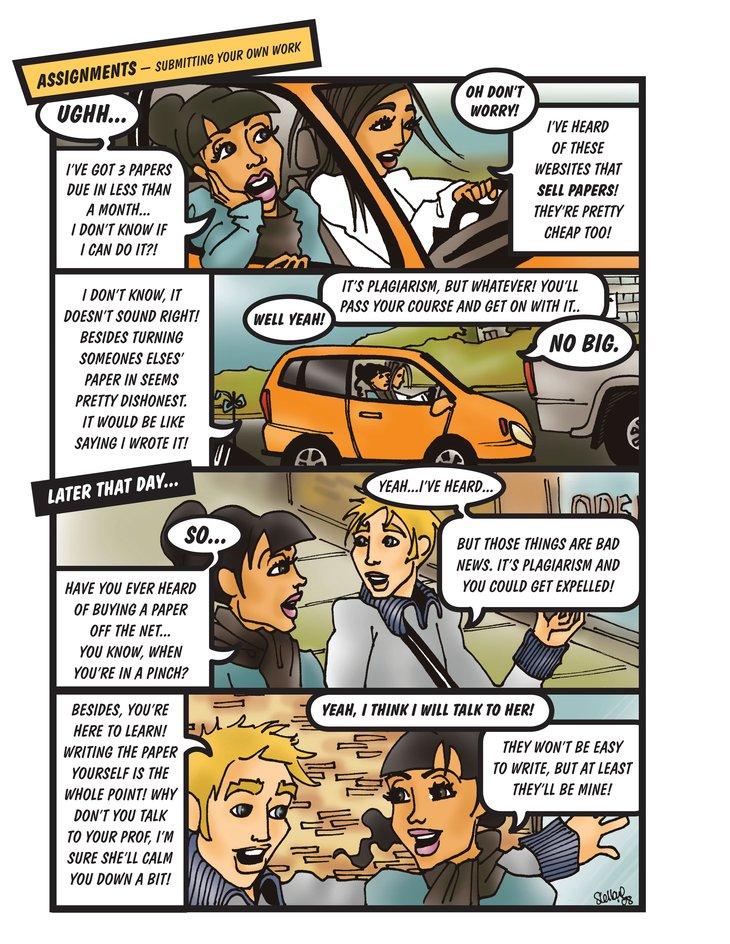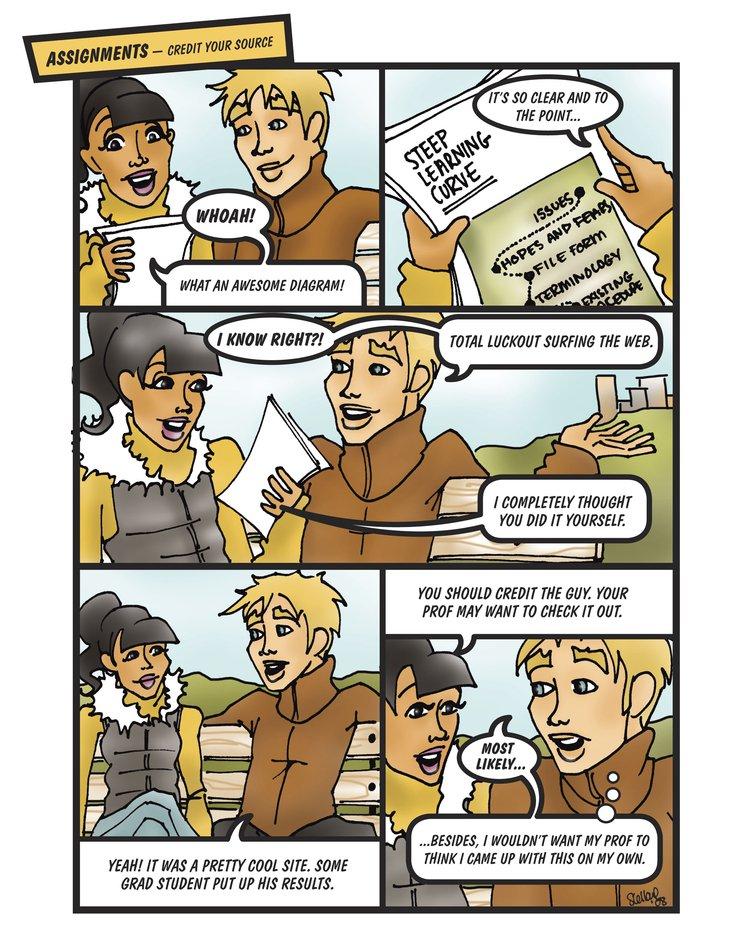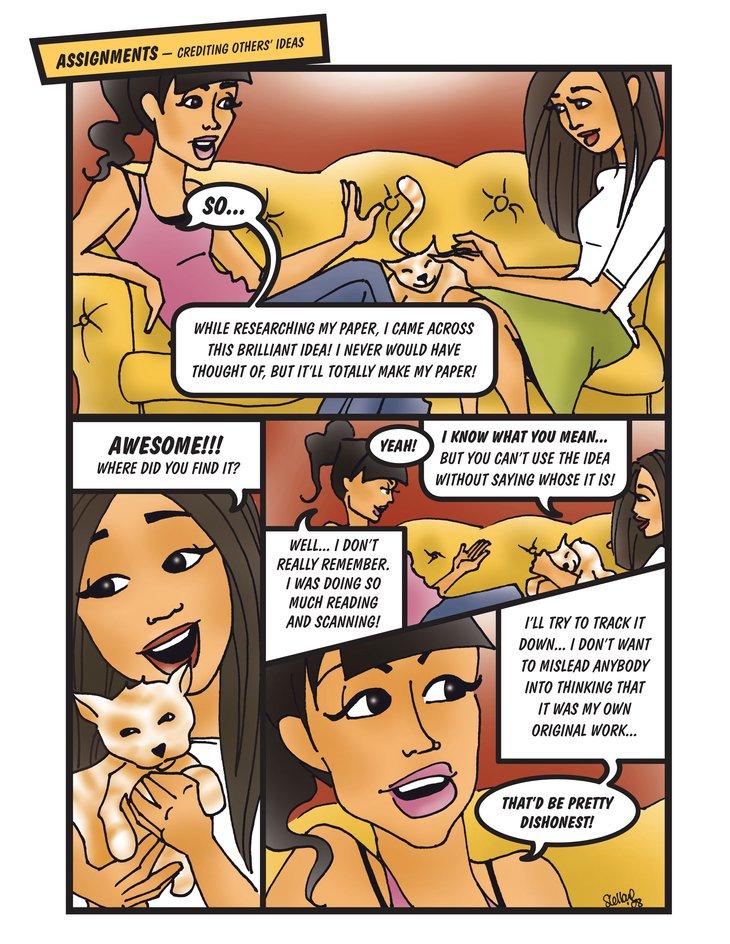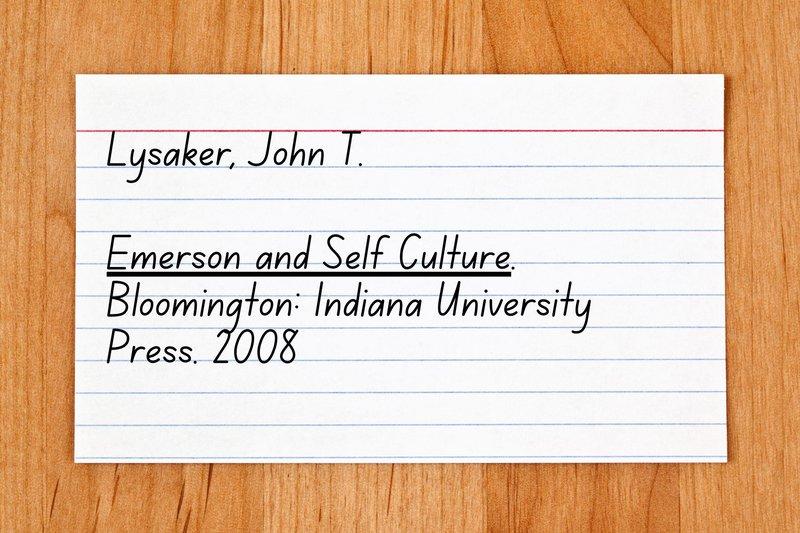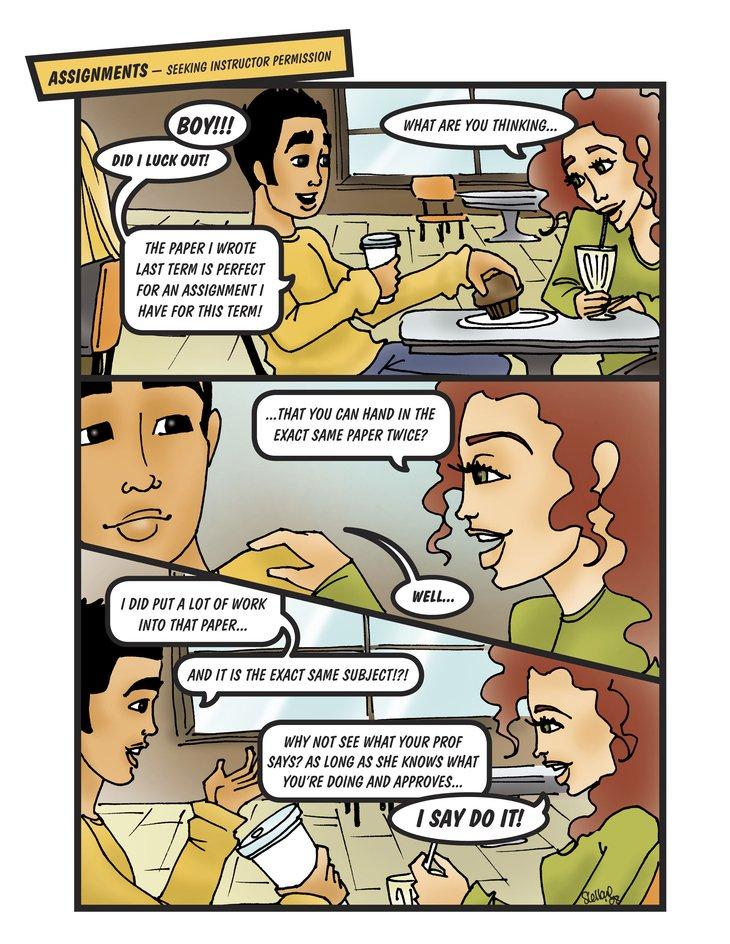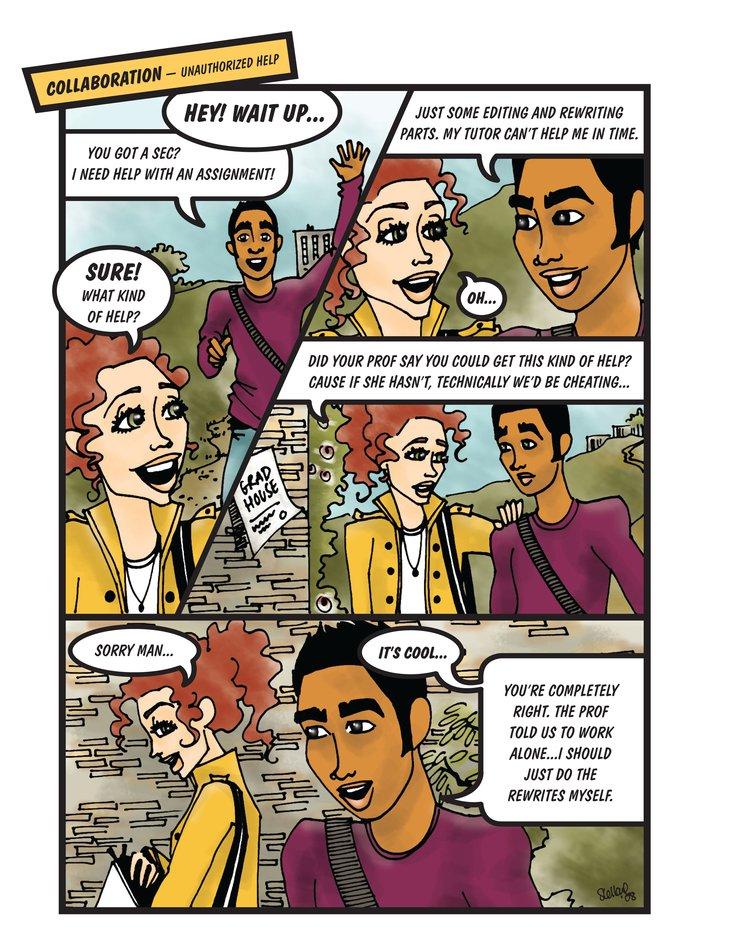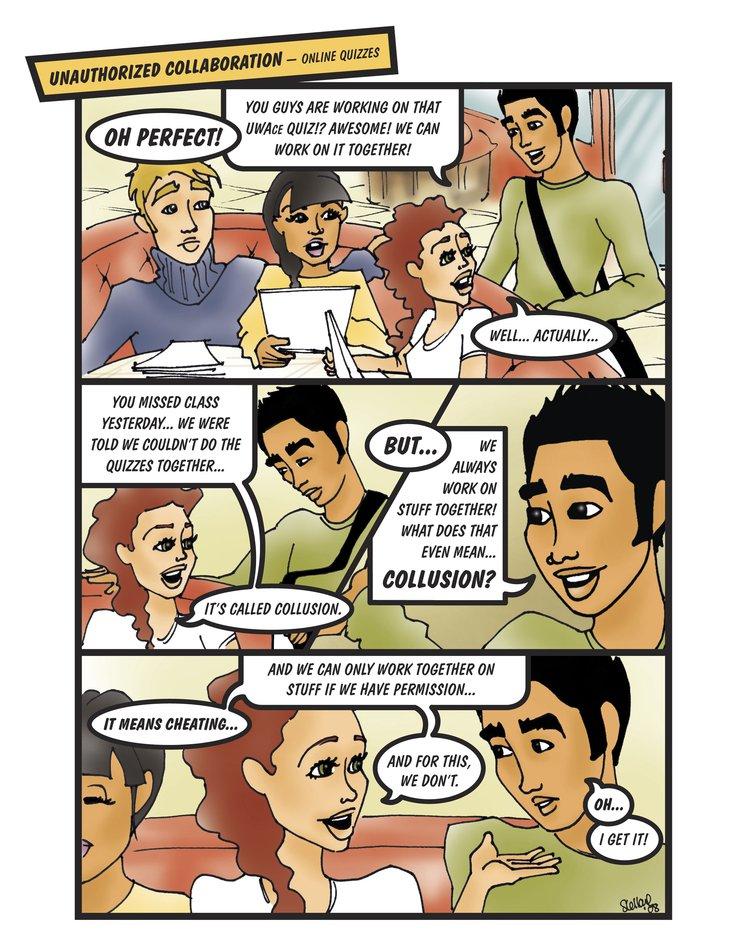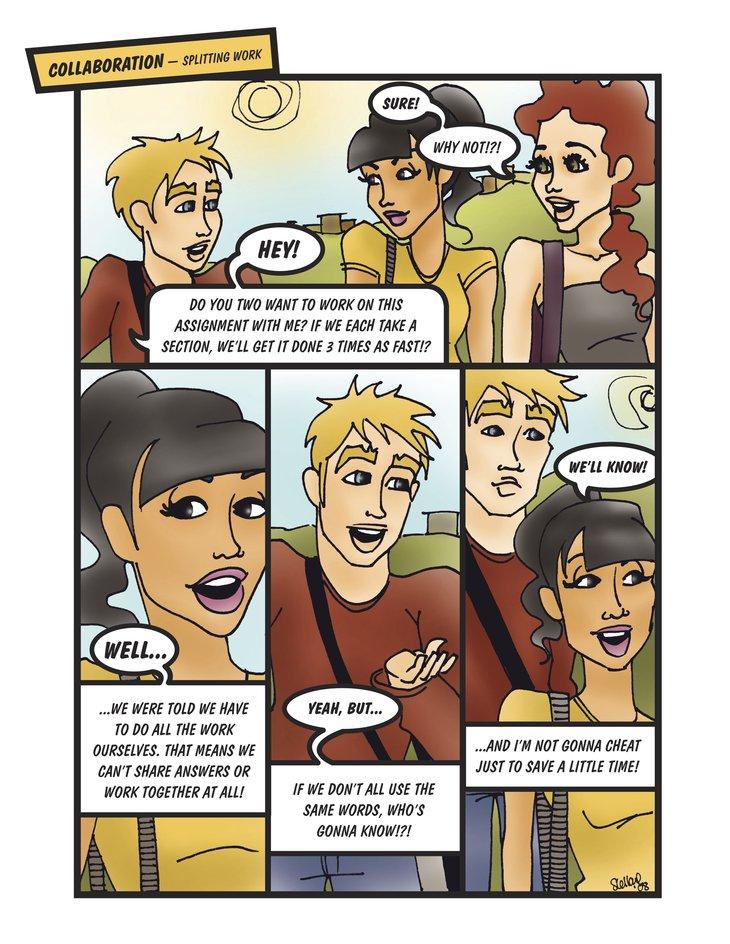
1
Welcome to GBC
Welcome to GBC
Welcome!
Welcome to the George Brown College family!
You're officially part of the GBC community and all set to create a positive future for yourself, your community and your world!
Will it be scary? Yes! Are you alone? Of course not! Whether you're studying online or in person, we are here to help guide you in your journey through, and beyond, George Brown College.
Prefer audio?
If you prefer audio learning, you can listen to this module as a discussion instead! (Created by Google LM.)
Land Acknowledgement
George Brown College is located on the traditional territory of the Mississaugas of the Credit First Nation and other Indigenous peoples who have lived here over time. We are grateful to share this land as treaty people who learn, work and live in the community with each other.
Make sure to check out everything our Indigenous Initiatives team does to promote knowledge sharing and support Indigenous students in achieving their goals, including running a mentoring program for Indigenous students. The team also facilitates captivating events, workshops and social gatherings for our entire community!
This Is Who We Are
Our community is a wonderful mosaic of differences. Each person at George Brown brings unique values and life experiences, and we represent every race, age, gender, ability, sexuality, nationality, religion and ethnicity. At George Brown, we embrace this diversity and continuously look for ways to celebrate it and grow with and through our differences. This is what allows us to thrive personally and collectively!
At GBC we pride ourselves in making sure we work in an environment that embraces:
- Honesty
- Equity
- Trust
- Fairness
- Respect
- Responsibility

College Values
As a college community, we are committed to the values that underpin our purpose of supporting students and employees as a leading post-secondary institution.
Our values influence everything we do, including how we teach, learn, work, research and interact with each other. They represent the essence of our college community and what we strive to achieve. Our values are more than aspirational; they are practical tools that will help inform our actions and decision-making, particularly during times of uncertainty.
At George Brown College, we value
Learners and Learning
- We prioritize the needs, successes, and well-being of our learners.
- We embrace innovation and curiosity to discover potential.
Equity and Belonging
- We foster a culture of inclusion and respect.
- We honour Indigenous knowledges and practices.
- We advance anti-racism, anti-oppression, and accessibility.
Collaboration and Community
- We create supportive and cooperative spaces.
- We listen to and learn from each other.
Accountability
- We take responsibility for our decisions.
- We act with integrity, respect, and compassion.
Sustainability
- We strive to ensure that the social, environmental, and economic impacts of our actions benefit future generations.
Following the college's values allows us to thrive and succeed together.
How? Well, by sticking to these values, you thrive as a student. By doing so, you develop key skills that leave you better prepared for the workforce expectations you will encounter when you graduate. The college thrives because we are co-creating an ethical and productive environment in which we can learn, work and succeed together!
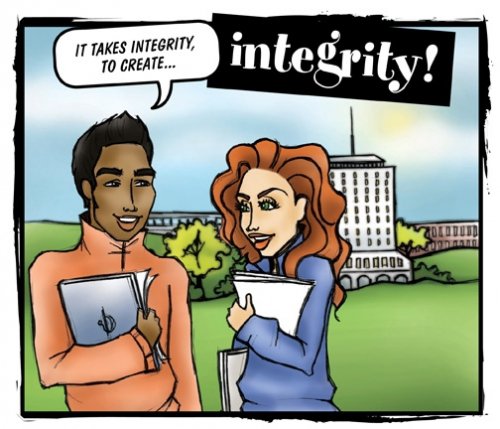
Academic Integrity
What is academic integrity and why is it important at GBC?
As a student, you are responsible for academic integrity in all your academic work, including learning, scholarship and field placement. We do our part to ensure your success with our ongoing commitment to continuously advance and improve our programs so that you have the most up-to-date and relevant content taught by a team of experienced faculty and support staff.
Understanding academic integrity
Below are some examples of situations that relate to academic integrity so you can develop a deeper understanding of what academic integrity means for you at George Brown College, both on and off campus. Keep in mind that the examples below do not cover all of the possible scenarios. For more information, please refer to our Academic Integrity Policy.
These scenarios highlight things you may face in your academic work.
Exams
Keep your eyes on your exam
When taking an exam where independent work is required, a student who copies another student's work is guilty of academic misconduct.
Graphic by Sara LeBlanc
Transcript:
Male. Oh man. This exam is harder than I thought. I probably should’ve studied harder last night! Catherine seems to know what she’s doing. Maybe I could just take a peek. No. I should do this myself! Besides If I got caught, we’d both be in trouble.
Protect your work from prying eyes
If you are taking an exam where independent work is required and you allow another student to copy your work, you are guilty of academic misconduct.
This is a violation of the fairness principle, because aiding the unfair advantage of one student over any other student interferes with a culture of academic integrity.
Graphic by Sara LeBlanc
Transcript:
Student sitting writing an exam. Female. This is perfect. I studied all this stuff, I’m gonna ace this exam! Awesome. What is he doing? He’s totally trying to see my answers. Well, he did help me out last year with studying. Maybe… No way! I studied super hard for this! And if he cheats off me, I’m just as guilty as he is. Besides, I’ll be earning my mark.
Level the playing field by reporting academic misconduct
If you witness situations of academic misconduct, such as copying exam answers, you should communicate your observations to the instructor. This promotes a culture of academic integrity.
Reporting someone's academic misconduct isn't always easy, but it is the right thing to do.
Graphic by Sara LeBlanc
Transcript:
Students writing an exam. Male. Did I just see that!?! That girl just pulled a cheat sheet out of her sleeve! Am I the only one that sees this? That makes me so mad. She’s gonna get an awesome grade because she cheats! I really want to tell the prof, but I’m not a snitch. I have to tell him. It really is the right thing to do.
Don't lie
Fabricating is the invention or alteration of information or data, with the intention to mislead.
Lying, by using a false note or excuse to postpone writing an exam or quiz, is a form of fabrication and is a violation of the honesty and trust values inherent in academic integrity.
Graphic by Sara LeBlanc
Transcript:
Male student talking with female student sitting on couch while she reads a magazine.
Male. I don’t know what I’m going to do – there’s no way I’m ready for this exam! Female. That sucks. Maybe you shouldn’t have gone out last night. Male. I have to get out of it…I know! I’ll tell the prof that my grandma died! Then I’ll get some extra study time! Genius!!! Female. That is so wrong! On so many levels… you can’t lie to get out of an exam! Male. You’re right…. I’ll just have to write it today.
Working together on take-home exams
It is considered cheating to collaborate on exams, tests, projects or assignments when faculty instructions are to work separately.
Graphic by Sara LeBlanc
Transcript:
Two students talking on a bench. Female 1. Hey! Grab your take home exam and let’s get workin’! Female 2. oh, we’re allowed to work on it together? Female 1. Who’s gonna know? It’s a take home! Female 2. Well, The prof told us we had to work on it alone. If we work together we’d be cheating. Sorry, you’re on your own! Female 1. No worries, see you later!
Don't alter a marked exam for re-submission
Your professor hands back marked exams and tells the class to carefully check the grading, in case an exam has been graded unfairly. You realize you have answered a question wrong, even though you knew the correct answer. You scribble in the correct answer and resubmit the paper. This is an example of academic misconduct.
Tests submitted for re-grading may not be altered in any way, even if you did know the correct answer at the time of the exam.
Graphic by Sara LeBlanc
Transcript:
Ok everybody, remember to check the grading and come see me if TA’s missed anything! Student. Oh no I didn’t finish answering a question and lost marks! If I add it now and say it was the TA’s mistake no one will know! No I can’t do that it’s not the TA’s mistake and I’ll just have to live with it!
Assignments
Submit assignments that are your own work
Any assignment you submit (essays, papers, lab assignments) must be your own work. Representing someone else's work as your own is plagiarism.
If you submit someone else's work as your own, even with permission, you are not only violating the principles of academic integrity, but you are also implicating that person in academic misconduct. Allowing someone to represent your work as their own is also academic misconduct.
It is a serious offence to take credit for a paper that you did not write yourself, for example: a paper prepared by an essay-writing service. Such an offence may result in suspension or expulsion from the college.
Graphic by Sara LeBlanc
Transcript:
Two females driving in a car.
Female 1. I’ve got 3 papers due in less than a month. I don’t know if I can do it?! Female 2. Oh don’t worry. I’ve heard of these websites that sell papers. They’re pretty cheap too. Female 1. I don’t know, it doesn’t sound right. Besides turning someone elses’ paper in seems pretty dishonest. It would be like saying I wrote it. Female 2. Well yeah. It’s plagiarism, but whatever! You’ll pass your course and get on with it. No big.
Later day that. Female. So, have you heard of buying a paper off the net. You know, when you’re in a pinch? Male. Yeah, I’ve heard. But those things are bad news. Its plagiarism and you could get expelled. Besides, you’re here to learn. Writing a paper yourself is the whole point! Why don’t you talk to your prof, I’m sure she’ll calm you down a bit. Female. Yeah, I think I will talk to her. They wont be easy to write, but at least they’ll be mine.
Credit your source
To avoid committing plagiarism, you must acknowledge the source1 of anything included in your submitted assignment that is not your own work.
Your assignment can include a passage of text, an audio or visual object, computer code, data set, or someone's original idea. Your source may be a book, journal article, the Internet, even a conversation or email message. You must acknowledge the origin of the work.
Your instructor needs to know what parts of the work are your original thoughts, ideas and research.
Citing sources is an important part of the academic process. Your readers need to know where to locate the source in order to pursue further work on the subject.
Graphic by Sara LeBlanc
Transcript:
Female student and male student looking at papers. Female. Whoa!! What an awesome diagram! It’s so clear and to the point. Male. I know right?! Total luckout surfing the web. Female. I completely thought you did it yourself. Male. Yeah! It was pretty cool site. Some grad student put up his results. Female. You should credit the guy. Your prof may want to check it out. Male. Most likely… besides, I wouldn’t want my prof to think I came up with this on my own.
1 Adequate acknowledgement is typically achieved through citing your source and including it in a reference list formatted according to one of the standard style guides. See cite your sources for more information.
Credit others' ideas
Credit your source if you are using someone else's ideas in your paper.
Not only should you cite your source for quoted text, you must cite your source for ideas that are not originally yours1 and are not common knowledge2.
Graphic by Sara LeBlanc
Transcript:
Two female students sitting on the couch with a cat in between them. Female 1. So… while researching my paper, I came across this brilliant idea! I never would have thought of, but it’ll totally make my paper! Female 2. Awesome!!! Where did you find it? Female 1. Well…I don’t really remember. I was doing so much reading and scanning! Female 2. I know what you mean…but you can’t use the idea without saying whose it is! Female 1. I’ll try to track it down…I don’t want to mislead anybody into thinking that it was my own original work… that’d be pretty dishonest!
1 As a rule, error on the side of caution and provide a citation if you have any doubt. When to provide credit can be a matter of judgment. Your sense of when a citation is needed will develop with experience.
2 "Common knowledge" is information that is widely known and easily verified in a standard reference work.
Taking notes and citing sources
To avoid inadvertent plagiarism, follow these tips:
- Keep track of potentially useful sources as you find them
- Take notes as you research and investigate your topic
- Know how to cite your sources
One method of keeping track of sources is to use index cards. Enter a source's publication information on an index card. Format the entry in the citation style you will be using in your paper.
Take notes as you research and investigate your topic
Indicate whether you are summarizing, paraphrasing, or quoting and be sure to include a connection with your source. Use note card (a larger index card), and try to restrict content to one main idea.
Know how to cite your sources
Your citations must be consistently formatted in a particular style. Citation and style guides links to online guides and support for style guides. Your choice of style depends on your area of research. Ask your instructor or a librarian for advice.
Seek permission before reusing a paper
Contact your instructor before submitting a paper that you previously submitted for a different assignment or purpose. If you would like to use the same paper, or papers with significant overlap, for different courses, explicit permission from the instructor of each course is necessary.
Reusing a paper is not always wrong. A paper you have already written may be very appropriate and speak to the topic assigned. The consideration is to avoid misleading the instructor. A student of academic integrity will communicate with the instructor to explain why a previously written paper is appropriate for the current assignment, and request permission to use it again. The student should be honest.
Graphic by Sara LeBlanc
Transcript:
Male and female student talking.
Male. Boy! Did I luck out! The paper I wrote last term is perfect for an assignment I have for this term. Female. What are you thinking, that you can hand in the exact same paper twice? Male. Well, I did put a lot of work into that paper. And it is the exact same subject. Female. Why not see what your prof says? As long as she knows what you’re doing and approves, I say do it!
Collaboration
Unauthorized help
You pay a tutor for editing assistance, and they drastically re-write your original paper. Can you submit this new, edited version to your professor?
No, this is called collusion, which involves receiving unauthorized help from tutors and friends in writing your essay. It is important to clarify with your professor or teaching assistant what type of help (if any) is acceptable for a specific assignment.
If you use your friend's work without crediting them, your friend is also guilty of academic misconduct. Even if your friend is not aware that you are plagiarising their work, your friend will still be subject to penalties.
Graphic by Sara LeBlanc
Transcript:
Two students walking. Male. Hey! Wait up! You got a sec? I need help with an assignment. Female. Sure! What kind of help? Male. Just some editing and rewriting parts. My tutor can’t help me in time. Female. Oh, did your prof say you could get this kind of help? Cause if she hasn’t , technically we’d be cheating. Male. It’s cool. You’re completely right. The prof told us to work alone. I should just do the rewrites myself. Female. Sorry man.
Online quizzes
One of your courses has a series of online quizzes, which students have to master before moving on to the next stage. Several people in your residence are in the same class and you normally do the modules together.
The college would consider this to be unauthorized cooperation or collaboration, and is an example of academic misconduct.
Graphic by Sara LeBlanc
Transcript:
A group of students talking.
Male. Oh perfect. You guys are working on that UWACE quiz!? Awesome! We can work on it together. Female. Well, actually, you missed class yesterday. We were told we couldn’t do the quizzes together. It’s called collusion. Male. But, we always work on stuff together! What does that even mean…collusion? Female. It means cheating. And we can only work together on stuff if we have permission. And for this, we don’t. Male. Oh, I get it.
Sharing computer code
Sharing code for a computer program is only appropriate when your instructor has explicitly permitted collaborative work. If you are required to write code for a project, the code must be your own work. Do not borrow code or the solution from another student or source.
Graphic by Sara LeBlanc
Transcript:
Male. Yes!!! Finally! I got it!”. Female. Hey!!! I’m getting nowhere on the code for this project! Have you made any progress at all? Male. You know… I’d really like to help, but we’re supposed to work on our own for this. Female. Can’t you just help me with one little part!?! It’s the only piece I’m stuck on! Male. I really can’t help you with any of it…sorry. Female. I know I’ll get it on my own, I just need to give it another go! I’ll come back when I’m done and we can both celebrate!
Splitting the work
If your instructor has indicated that independent work is required, you cannot work together or share answers.
Graphic by Sara LeBlanc
Transcript:
Students talking. Male. Hey! Do you two want to work on this assignment with me? Of we each take a section, we’ll get it done 3 times as fast! Female 1. Sure, why not. Female 2. Well, we were told we have to do all the work ourselves. That means we cant share answers or work together at all! Male. Yeah, but if we don’t all use the same words, who’s gonna know!?! Female 2. We’ll know! And I’m not gonna cheat just to save a little time.
For more examples, check out this Academic Integrity Tutorial by the University of Waterloo Library | CC BY-NC

What's Coming Next
In module 1, you learned about who we are as a college and how you can demonstrate academic integrity. In the next module, you will find out what you need to do and know about at the start of what will be a successful first semester. You’ll discover how to get your student ID, important dates to note, your required accounts and more!
